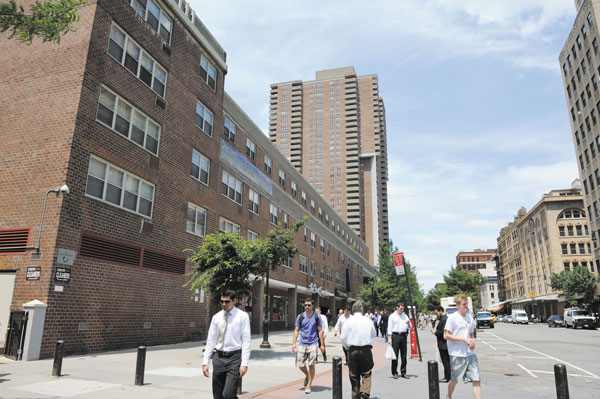
BY TERESE LOEB KREUZER | For almost seven years, tenants of Independence Plaza North have been fighting with their landlord, Lawrence Gluck, principal of Stellar Management, over how much rent they owe, and there’s no end in sight to a legal battle that has already cost hundreds of thousands of dollars and has caused numerous tenants to throw in the towel and move.
Independence Plaza North on Greenwich Street just north of Chambers Street in Tribeca has 1,331 apartments ranging in size from studios to two bedrooms plus three-bedroom town houses. It was built in 1974 as a Mitchell Lama project designed to encourage the construction of moderate-income housing. Because of real estate tax breaks and low-interest loans and mortgages, Mitchell Lama developers were legally required to offer rents and sale and resale prices (in the case of co-ops) at below-market rates.
In 2003, Gluck bought Independence Plaza North and announced plans to remove it from the Mitchell Lama program. He stated at that time that it wasn’t rent regulated and did not tell tenants that there was a J-51 tax abatement in place. He took the development out of the Mitchell Lama program on June 28, 2004. Subsequently, it turned out that Gluck was receiving J-51 tax benefits. He repaid them retroactively, claiming that this ended his obligation to charge anything other than free-market rents.
To date, there have been three separate lawsuits, the first of which was brought in September 2004 over a 30 percent increase in rent that Gluck imposed on around 200 tenants. Subsequent lawsuits were brought by tenants who were living in I.P.N. as of June 28, 2004 and those who moved in thereafter, paying free-market rents. All have had to do with whether the apartments were rent regulated and with the size and nature of the rent increases.
On Aug. 30, 2010, Judge Marcy S. Friedman of the Supreme Court of the State of New York ruled that the complex was rent stabilized and should remain so until the tenants in residence at the time of the lawsuits moved out. On June 10, 2011, Stephen Meister of Meister, Seelig & Fein, attorneys for the landlord, filed an appeal. Seth Miller of Collins, Dobkin & Miller, who is representing the I.P.N. Tenants Association plus numerous individual tenants, has until Aug. 10, 2011 to respond.
I.P.N. tenants are paying rent under three different arrangements. Some have federal vouchers that split the rent between the tenant — who pays about a third of his or her income — and the federal government, which pays the rest.
A second group of tenants who were not eligible for vouchers are part of a New York City-sponsored Landlord Assistance Program that mimics rent stabilization. “Whatever the increase is under rent stabilization, that’s what we get,” said John Lynch, a vice president of the I.P.N. Tenants Association.
A third group pays free-market rents. One of the free-market tenants who has lived at I.P.N. for almost a year and who asked not to be identified, said that he and his wife saw their apartment and liked it, realizing only after they had moved in that the building was “rent controlled in some way and that there were all these disproportionate rents.” They are party to one of the lawsuits.
At free-market rents, studios at I.P.N. start at $2,350, one bedrooms at $3,450 and two bedrooms at $4,400. Townhouses are available for $5,800 and up.
“With the free-market tenants there’s a lot of turnover,” said Diane Stein, a long-term tenant. “It seems like somebody’s moving in and out all the time. But with the voucher tenants – because the vouchers are tied to your income – if they get a job or if an adult child gets a job – the rent then increases and some voucher tenants had to leave as well.”
“A lot of people have been forced out,” John Lynch concurred. “They just couldn’t afford it. I just heard someone in the elevator say, ‘I gotta get out of here. They just increased my rent another couple of hundred dollars.’ That’s a free-market tenant. But many others have had to move. They couldn’t afford it.”

































